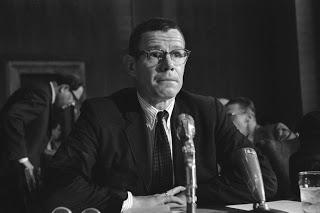
Thomas C. Schelling
Besides mass shootings, hurricanes and ongoing investigations into election meddling, the United States is currently embroiled in gamesmanship with North Korea. Kim Jong Un, continuing his country's long-standing habit of lunatic saber-rattling, has spent the past few months challenging America and its allies with increasingly brazen missile tests over the Pacific. Unfortunately, our President has responded in kind, taunting Kim as "Rocket Man," threatening him with "fire and fury" and dismissing his own Secretary of States' efforts at peaceful mediation.Rather than letting Kim burn out his fuse up there alone, Trump acts determined on violent confrontation. Several recent editorials have noted it as a logical extension of Trump's blustering rhetoric over NAFTA, NATO, the Middle East and domestic politics, some even positing that it is deliberate strategy. This weekend, Axios seemed to confirm this, quoting Trump as telling diplomats that "if [North Korea and China] don't give the concessions now, this crazy guy will pull out of the deal." Of course, considering how he acts ninety percent of the time, how could they tell?
Any comprehensive assessment of political madness, feigned or otherwise, should range back to Caligula and Tiberius, Tamerlane and Vlad the Impaler - bloodthirsty leaders who were, by most accounts, genuinely deranged. But what about stable leaders posing as madmen to achieve political goals? This goes back at least to Machiavelli, but its modern incarnation can be traced back to the 1950s. It was born amidst memories of battling Nazi Germany and the inherent insanity of the Cold War stalemate, where a miscalculation could annihilate the world.
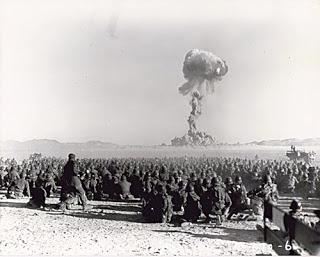
Nuclear test at Yucca Flats, Nevada, 1951
Thomas C. Schelling was an economist and Harvard professor who assisted in developing modern game theory. He served as a consultant to the RAND Corporation, joining their assessments of nuclear threats and brinkmanship. Seemingly unsolvable tensions with the Soviet Union led to confrontations that stopped short of war, from Hungary to the Suez Crisis, or filtered into proxy conflicts like Korea and Indochina, where neither side willing to commit to total war. Nuclear weapons worked both as threat and deterrent, collecting their own grim momentum.Sometimes credited with originating brinkmanship, Schelling mainly codified extant theories and policies. Henry Kissinger, another Harvard professor, wrote a book entitled Nuclear Weapons and Foreign Policy in 1957 advocating a "strategy of ambiguity" to keep the Soviets off balance. Dwight Eisenhower and his Secretary of State, John Foster Dulles, developed on their own the concept of massive retaliation, hoping to check Soviet expansionism with nuclear threats. Most were general contingencies; some were explicit threats, as in Eisenhower's plan to unleash atomic weapons if peace talks in Korea failed.
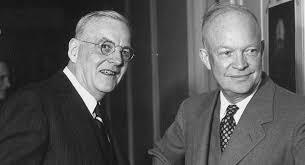
John Foster Dulles and Dwight Eisenhower
Schelling pushed these examples to their extreme. Where other theorists like Kissinger and Herman Kahn (author of On Thermonuclear War, whose ideas about an automatic "doomsday machine" inspired Dr. Strangelove) couched their ideas about deterrence in cold logic, Schelling advocated calculated acts of madness. Schelling began issuing lectures where he described international relations in the vein of the Prisoner's Dilemma, with one party issuing threats obliging the other to react. One student recalled Schelling's mindset:"So you’re standing at the edge of a cliff, chained by the ankle to someone else. You’ll be released, and one of you will get a large prize, as soon as the other gives in. How do you persuade the other guy to give in, when the only method at your disposal—threatening to push him off the cliff—would doom you both? . . . Answer: You start dancing, closer and closer to the edge. That way, you don’t have to convince him that you would do something totally irrational: plunge him and yourself off the cliff. You just have to convince him that you are prepared to take a higher risk than he is of accidentally falling off the cliff. If you can do that, you win. You have done it by using probability to divide a seemingly indivisible threat. And a smaller threat can be more effective than a bigger one. A threat to drag both of you off the cliff is not credible. A threat to take a 60 percent chance of that same thing might be credible. . . . Madness can be wickedly rational."Schelling expanded his thoughts on this "wickedly rational" madness in a book called The Strategy of Conflict, published in 1960. Essentially, Schelling blames nuclear deadlock on America and the USSR treating each other as equally rational, their motives parallel if not exactly identical. This led to stagnation and indecision, periodically interrupted by "provocative" moves by Nikita Khrushchev, whose belligerent rhetoric belied reasoned response. "Where trust and good faith do not exist and cannot be made made to by acting as though they did," he wrote, "we may wish to solicit the advice of the underworld, or from ancient despotisms, on how to make agreements work."
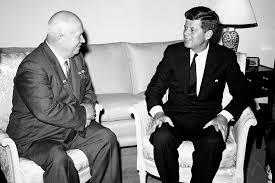
Nikita Khrushchev and John F. Kennedy
More than such disreputable forebears, World War II informed Schelling's thinking. Throughout the 1930's, Adolf Hitler and Benito Mussolini repeatedly extorted territorial concessions from Britain and France because they were willing to risk war, and their opposition wasn't. While different leaders drew conflicting lessons about the conflict with fascism, conventional wisdom suggested that the Soviets, for all their repression and eagerness to export revolution, acted far more rationally than Hitler and couldn't be treated the same way. Unless the West stole a march on Khrushchev with their own Hitler-esque actions.Numerous observers picked up on Schelling's claims, from Oskar Morgenstern fretting over the opportunities for nuclear blackmail entailed to John F. Kennedy attacking Eisenhower for an alleged "missile gap" throughout the 1960 presidential campaign. Schelling grew acquainted with filmmaker Stanley Kubrick, helping him develop Dr. Strangelove. Another particularly ardent student was another Harvard professor and RAND employee, an acquaintance of both Schelling and Henry Kissinger: Daniel Ellsberg.
Long before the Pentagon Papers assured him notoriety, Ellsberg was a cutting edge Cold Warrior. He followed Schelling in arguing that "rational" statesmanship had its limits in politics. In an essay entitled "The Theory and Practice of Blackmail," Ellsberg argued that madness and nuclear blackmail could work when "a single threatener confronts a relatively passive subject." He added that "none but rational behavior is subject to coercion, only the man rational in this sense can be blackmailed or coerced."
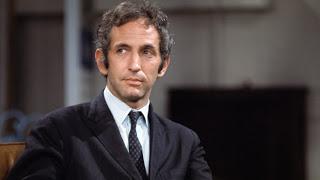
Daniel Ellsberg
That said, Ellsberg's commentaries (also including a lecture, reportedly attended by Henry Kissinger, entitled "The Political Uses of Madness") were mostly an attempt to forestall actions by other, irrational adversaries. More than Schelling, his invocation of Hitler and other fascist leaders intended to highlight how dangerous such a practice could be. "I didn't even imagine that an American president could consider such a strategy," he told Seymour Hersh.John F. Kennedy's administration saw heavy military build-up (despite their admission that the "missile gap" was nonexistent) and repeated confrontations with the Soviets in Berlin, Cuba and elsewhere. Secretary of Defense Robert MacNamara formally proclaimed the doctrine of Mutually Assured Destruction, appropriately acronymed MAD, which reinforced that the United States would maintain a strike force of missiles, bombers and submarines that would ensure nuclear dominance. Despite this, Kennedy and his successor, Lyndon Johnson, avoided the overtly irrational behavior that Schelling, Ellsberg and others advanced.
All this before Richard Nixon proclaimed his Madman Theory. H.R. Haldeman, his chief of staff, recalled the President telling him shortly before the 1968 election: "I want the North Vietnamese to believe I've reached the point where I might do anything to stop the war. We'll just slip the word to them that, "for God's sake, you know Nixon is obsessed about communism. We can't restrain him when he's angry—and he has his hand on the nuclear button" and Ho Chi Minh himself will be in Paris in two days begging for peace."
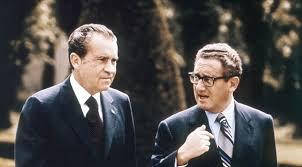
Richard Nixon and Henry Kissinger
It's unlikely that Nixon developed this formulation on his own: he named Henry Kissinger as his National Security Adviser, after all, and as Eisenhower's Vice President he'd witnessed the crises at Korea, Dien Bien Phu and Suez firsthand. Nonetheless, faced with a stalemated war in Vietnam and a pledge to achieve "peace with honor," he weighed exceedingly reckless "signals" to America's communist adversaries.It wasn't long before Nixon demonstrated his madness with secret bombings of Cambodia and Laos, which were concealed from the public and, initially, some of his own advisers. At the same time he had Kissinger and other diplomats signal the Soviets that he was acting "irrationality," a transparent ploy that achieved little. Nixon had far more drastic plans in mind, however, notably Operation Duck Hook. This proposed bombing of the Red River dikes in North Vietnam, potentially flooding the country and killing 300,000 civilians (along with millions more potentially starved through destruction of farmland). Should this fail to work, Duck Hook included a contingency deploying tactical nuclear weapons.
Two of Kissinger's aides, Roger Morris and Anthony Lake, advised strongly against this operation. They warned that "since we cannot confidently predict the exact point at which Hanoi could be likely to respond positively, we must be prepared to play out whatever string necessary." Kissinger added that "to achieve its full effect on Hanoi's thinking, the action must be brutal." Nixon hinted this action in a draft speech from August 1969, never delivered, announcing that "It is our common responsibility...to demonstrate our unflinching resolve to end this war."
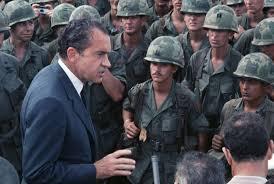
Nixon visits the troops
Several factors caused Nixon abandon Duck Hook. Secretary of State William Rogers and Defense Secretary Melvin Laird both adamantly opposed the plan; public opinion, cresting in the National Moratorium Against the War that October, undermined its popularity. Worse, Kissinger and the military chiefs couldn't guarantee success. Lawrence Lynn, one of Kissinger's aides, cautioned that "a short, vicious, punishing blow was impossible" based on this operation, while Laird felt that Nixon "could accomplish the same thing without using the assets he wanted to use."Next, Nixon decided to try intimidating the Soviets. In early October, he authorized an extended nuclear exercise, code-named Operation Giant Lance, wherein nuclear bombers spent several days buzzing Soviet airspace. Nixon's precise motivations for this bizarre incident remain unclear, with many relevant documents remaining classified; apparently, he hoped that he could intimidate the USSR into brokering a peace in Vietnam. If so, he failed; Leonid Brezhnev and his advisers certainly noticed the provocation, but couldn't make sense of it.
Nixon eventually implemented portions of Duck Hook and other "madman" ideas piecemeal, whether in invading Cambodia and Laos, mining Haiphong harbor and increased bombings of the North. In 1972, amidst North Vietnam's Easter Offensive, he again contemplated the ultimate step: "A nuclear bomb, does that bother you?" When Kissinger proclaimed it "too much," the President implored his National Security Adviser to "think big...for Christ's sake!" and berated him that "You're so goddamn concerned about civilians, and I don't give a damn."
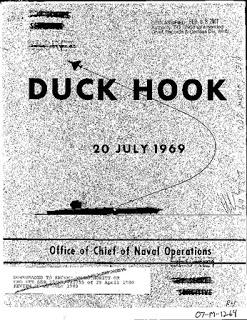 While Nixon achieved many notable diplomatic breakthroughs during his time in office - his SALT treaty with Brezhnev, the China opening - there's little evidence that his feigned "madness" influenced his communist adversaries. Nixon and Kissinger's handling of these incidents were certainly devious at times, but on the whole they made a play towards high-minded statesmanship. Nixon's madman saber-rattling only worked in Vietnam in so far as it allowed him to save face before abandoning South Vietnam to its fate.
While Nixon achieved many notable diplomatic breakthroughs during his time in office - his SALT treaty with Brezhnev, the China opening - there's little evidence that his feigned "madness" influenced his communist adversaries. Nixon and Kissinger's handling of these incidents were certainly devious at times, but on the whole they made a play towards high-minded statesmanship. Nixon's madman saber-rattling only worked in Vietnam in so far as it allowed him to save face before abandoning South Vietnam to its fate.Even if we ignore that it was a failure, Nixon's Madman Theory was a purposeful pose. He acted irrational but really wasn't; it was a way to pressure other countries into achieving diplomatic ends through unconventional means. Unfortunately (or fortunately), other countries saw through Nixon's pose, while his more sane advisers and public opinion restrained him from taking things to their logical conclusion.
Future presidents following his path weren't so lucky. Gerald Ford enhanced Nixon's detente policies; while Jimmy Carter's advocacy for human rights occasionally annoyed or alienated the Soviets, their only confrontations were proxy wars in Afghanistan, Angola and Central America. Ronald Reagan, in his first term, repeated and indeed enhanced Nixon's mistakes. In November 1983, an aggressive NATO exercise code-named Able Archer nearly led to a nuclear exchange with Russia. Reagan's determination to "win" the Cold War almost caused catastrophe; fortunately, his willingness to dialog with Mikhail Gorbachev cooled tensions and helped peacefully dismantle the Soviet Empire.
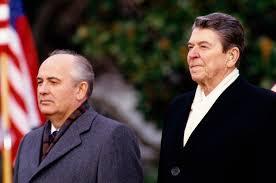
Mikhail Gorbachev and Ronald Reagan
The problem with Trump adopting such an approach is twofold. One, it's doubtful whether North Korea constitutes a "rational actor" in the generally-accepted sense; thus the circumstances while Schelling, Ellsberg and others describe don't even apply. Their whole existence is predicated on blackmailing neighbors with nuclear and conventional military threats - essentially, being madmen themselves. A rogue state is not a superpower, and assuming that intimidation and threats will work (especially if they aren't backed up by concrete action) against them is a gross misunderstanding.The second is that Donald Trump is Donald Trump. His behavior and persona as president inherently rests on erratic, violent and troubling rhetoric and actions. Put more bluntly, how much crazier could he be behind closed doors than he already acts in public? Nixon could play the cool, rational statesman, then have Henry Kissinger whisper to Anatoly Dobrynin that he had a screw loose and the USSR should tread carefully. Foreign leaders receiving confidences that Trump might be nuts will be forgiven for assuming that Tillerson, McMaster or whoever gets that plum assignment are merely stating the obvious.
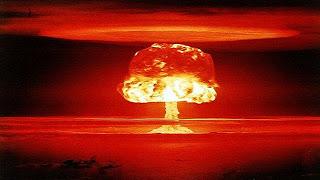 Other articles on Richard Nixon and related subjects:
Other articles on Richard Nixon and related subjects:- Richard Nixon Tells Archibald Cox, You're Fired!
- Richard Nixon's Deplorables
- The Sad, Sorry World of Watergate Memoirs
- Spiro Agnew Grooves On
- The State Department and the Madman, 1969-1970
- Watergate: Truth & Lies

